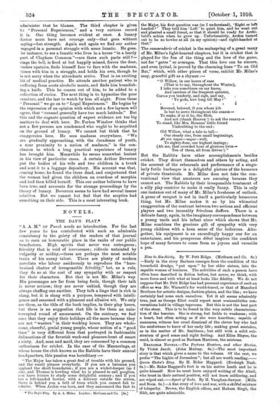NOVELS.
THE DAY'S PLAY.* "A. A. M." or Punch needs no introduction. For the last few years he has contributed with such an admirable consistency to the gaiety of the readers of that journal as to earn an honourable place in the ranks of our public benefactors. High spirits that never wax outrageous ; frivolity that is void of irreverence ; ridicule untainted by vulgarity or acidity,—these are perhaps the most notable traits of his sunny talent. There are plenty of modern novelists who labour assiduously to reproduce the "hare- brained chatter of irresponsible frivolity," but, as a rule, they do so at the cost of any sympathy with or respect for their characters. But that is not Mr. Milne's way. His personages are far from being fools, though their talk
is never serious; they are never unkind, though they are always chaffing one another. They talk a lingo that is rich in slang, but it is slang with a purpose, tempered with intelli- gence and seasoned with a pleasant and allusive wit. We only see them, as the title of the book implies, in their play hours, but there is no suggestion that life is for them an unin- terrupted round of amusement. On the contrary, we feel sure that they enjoy their holidays all the more because they are not "wasters " in their working hours. They are whole- some, cheerful, genial young people, whose notion of a "good time" is very different from that portrayed in fashionable delineations of the feverish week-end pleasure-hunt of smart 3ciety. And, man and maid, they are consumed by a common enthusiasm for cricket. In the case of the Mannerings, at whose house the club known as the Rabbits have their annual headquarters, this passion was hereditary :-
"The Major has taken a great deal of trouble with his ground, and the result pleases everybody. If you are a batsman you applaud the short boundaries ; if you are a wicket-keeper (as I am), and Thomas is bowling what he is pleased to call googlies, you have leisure to study some delightful scenery ; and if you are a Ieft-handed bowler, with a delivery outside the screen, there is behind you a belt of trees which you cannot fail to admire. When Archie was born, and they announced the fact to
' 'The Day's Play. By A. A. Milne. London: Methuen and Co. [66.] the Major, his first question was (so I understimd), 'Right or left handed ? ' They told him Left ' to quiet him, and he went out and planted a small forest, so that it should be ready for Archi- bald's action when he grew up... Unfortunately; Archie turned out to be no bowler at all (in my opinion)—and right-handed at that."
The casnaradirie of cricket is the mainspring of a great many of Mr. Milne's light-hearted chapters, but it is cricket that is played for the fun of the thing and the love of the game, not for " gates " or averages. That this love can be sincere, and even lyrical, is proved by the charming lines " To an Old Bat," which, with other pieces of verse, exhibit Mr. Milne's easy, graceful gift as a rhymer :— "0 Willow, in our hours of ease (That is to say, throughout the Winter), I take you sometimes on my knees, And careless of the frequent splinter, Caress you tenderly, and sigh, and say, ` Ye gods, how long till May ? '
• • • • • • Revered, beloved, 0 you whose job Is but to serve throughout the season-- To make, if so it be, the Blob, And not (thank Heaven !) to ask the reason--•
To stand, like Mrs. Hemans' little friend
Undoubting to the end :
Old Willow, what a tale to tell—
Our steady rise, from small beg,inninga, Ab ovo usgue—usgue—well, To eighty-four, our highest innings ; (Ah me, that crowded hour of glorious lives–• Ten of them, all from drives !) "
But the Rabbits- have other accomplishments besides cricket. They divert themselves and others by acting, and
the account of the rehearsals and performance of a singu- larly futile burlesque is a delightful picture of the humours of private theatricals. Mr. Milne does not take the con- ventional view that amateurs are amusing because they cannot act. The Rabbits by their irresponsible treatment of a silly play contrive to make it really funny. This is only one instance out of many of Mr. Milne's freshness of outlook. A game of croquet is not in itself a particularly humorous thing, but Mr. Milne makes it so by his whimsical exaggeration of the contrast between two serious and efficient players and two incurably frivolous duffers. There is a delicate fancy, again, in the imaginary correspondence between a young uncle and his infant niece which shows that Mr. Milne combines the gracious gift of sympathy with very young children with a keen sense of the ludicrous. Alto- gether, his equipment is an exceedingly happy one for an entertainer, and his prosperous debut inspires the confident hope of many favours to come from so joyous and versatile a pen.


























































 Previous page
Previous page